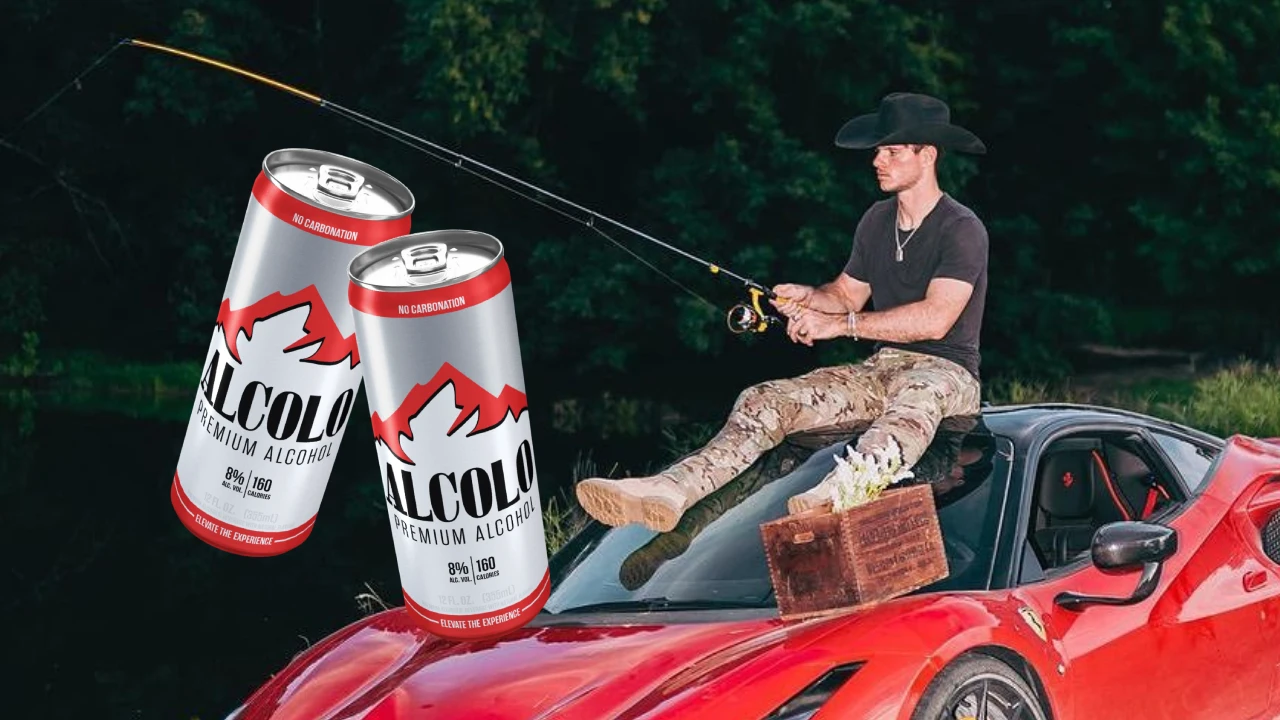Cody “WhistlinDiesel” Detwiler has once again proven his flair for disrupting the norm. Known for his audacious stunts, such as obliterating Teslas and luxury sports cars, Detwiler is now channeling his unique blend of creativity and business acumen into the beverage industry with the launch of his premium canned alcoholic drink, Alcolo.
This move is not just a product launch—it’s a case study in how digital influence and authentic branding can redefine traditional markets.
Table of Contents
The Birth of Alcolo: From a Spelling Error to a Beverage Brand
The genesis of Alcolo was serendipitous. During a brainstorming session, a simple misspelling of “alcohol” on a whiteboard sparked the idea for a product name that perfectly encapsulates WhistlinDiesel’s irreverent and bold brand identity. Detwiler saw potential in the slip-up, a reflection of his ability to turn unconventional moments into opportunities for innovation.
Detwiler spent a year meticulously crafting Alcolo, describing it as the “future of the beverage industry.” Unlike many influencer-led products that often face skepticism for being shallow cash grabs, Alcolo was built from the ground up. Detwiler’s insistence on involvement in every step of the process—from concept to production—emphasizes his commitment to authenticity and quality. This dedication resonates strongly in a marketplace increasingly wary of inauthentic branding.
More Than Just a Drink: The Alcolo Philosophy
At its core, Alcolo isn’t merely an alcoholic beverage; it’s a lifestyle product. Detwiler has positioned it as a reflection of his content ethos: fun, unforgettable, and daring. Packaged in a sleek 12-ounce can with 8% alcohol by volume, Alcolo sits comfortably between beer and wine in strength. This balance caters to a demographic looking for a drink that complements the energetic, adventurous vibe of WhistlinDiesel’s content.
According to Detwiler, Alcolo aims to be a generational product, transcending the temporary nature of many influencer-backed brands. “We wanted to build something legendary, iconic—something that could be passed down,” he explained. This long-term vision sets Alcolo apart in a space often dominated by quick wins and fleeting trends.
A Community-Driven Brand
One of the most significant advantages Detwiler brings to the table is his fiercely loyal fanbase. WhistlinDiesel’s audience is not just passive viewers—they are deeply engaged supporters who have demonstrated their loyalty through sold-out merchandise drops and large turnouts at his events. This sense of community is integral to the success of Alcolo.
Detwiler leveraged this loyalty during the initial launch phase, with promotional events tailored to his fanbase’s unique energy. A major kickoff event in downtown Nashville allowed fans to experience the product firsthand, reinforcing the idea that Alcolo is not just a beverage but a shared cultural moment. Detwiler’s approach to promotions—featuring truck rallies and over-the-top marketing stunts—aligns perfectly with his brand identity, creating a seamless transition from content creator to entrepreneur.
🛒Breaking Into Retail: A Remarkable Feat
In an era where retail giants are increasingly looking to digital creators for marketable products, Alcolo has managed to secure partnerships with major players like Walmart, Circle K, and Albertsons. For a newcomer in the crowded alcoholic beverage industry, this is a remarkable achievement. It underscores the growing recognition of influencer-led brands as viable contenders in traditional markets.

Andrew Graham, a key figure in Alcolo‘s launch, highlighted the strategic efforts to bridge digital influence with retail success. From wrapping WhistlinDiesel’s tank in the brand’s red and white colors to hosting truck rallies in Walmart parking lots, the promotional strategy has been as disruptive as Detwiler’s content. This approach not only builds excitement but also fosters a direct connection between the product and its audience.
Retailers have taken notice of this unconventional yet highly effective strategy. “Today’s stars are built online, and retailers understand that sales channels are evolving,” Graham stated. This perspective highlights a shift in how consumer products are marketed and sold, with influencer-driven brands leading the charge.
The Challenges of Authentic Branding
Launching a new product in the beverage industry is no small feat, particularly in a space dominated by legacy brands and well-established players. Detwiler acknowledges the challenges but sees them as part of the journey. “I came from nothing with no background in business,” he shared. His transition from construction work to managing a multi-brand empire is a testament to his grit and adaptability.
Detwiler’s refusal to compromise on authenticity has been central to Alcolo’s development. Addressing critics who suggested he merely promoted an existing drink, Detwiler clarified that Alcolo was conceptualized and developed independently. This transparency strengthens the brand’s credibility and deepens trust with his audience.
The Future of Alcolo
While Alcolo’s initial launch focuses on its core product, Detwiler has hinted at potential expansions, including new flavors and limited-edition releases. However, he remains cautious about overextending the brand. “Successful brands stay linear,” he explained, emphasizing the importance of staying true to the brand’s core identity.
Looking ahead, Alcolo has the potential to influence the broader beverage market. By demonstrating how digital creators can successfully leverage their platforms to launch authentic products, WhistlinDiesel is paving the way for other influencers to follow suit.
